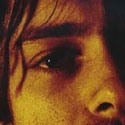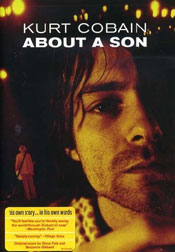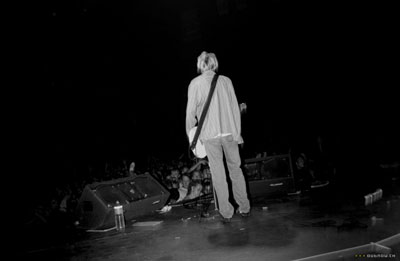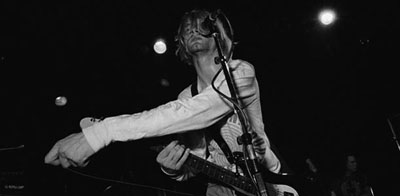
Kurt Cobain: About a Son
directed by AJ Schnack
Bonfire Films

No music journalist, other than maybe Brit Everett True, got closer to Kurt Cobain than Michael Azerrad. Azerrad, a veteran of Rolling Stone, was granted insider access to the Nirvana camp while writing their first authorized biography Come As You Are in the early ’90s. His research included hours and hours of taped conversations with frontman Kurt Cobain, where his guard seemingly (with a capital S) went down, and he held forth on his whole life, in an at times startlingly candid fashion, other times puncturing longstanding myths about the band. In time, the book was published. Nirvana got even bigger with the release of In Utero. Cobain killed himself and the rest is the stuff of rock mythology. But what about those tapes?
Well, director AJ Schnack took those interview recordings and fashioned a linear storyline of Kurt Cobain’s life in his own words, from childhood to an early punk rock epiphany to stardom to, well, the dark underside of stardom. Cobain’s words were paired with National Geographic-quality shots of Aberdeen, the neighborhood where he grew up, cosmopolitan Seattle, the punk rock utopia of Olympia, and shots of everyday life and passersby in all of those places. When Cobain tells of how his father was a logger, you get shots of a logging plant and the work that goes on there, when he speaks admiringly (and yet somewhat condescendingly) of a band playing on the street of Olympia, you get a shot of, well, a band playing a street in Olympia. It’s a fascinating exercise in illustrating his inner/outer monologue, pairing vivid slice of life snapshots with the confessions of a tortured rock star. There is no performance footage, there is no video of Cobain interviews; the only direct visual reference to the band is some black and white performance shots of Nirvana and the classic early ’90s Sub Pop/grunge scene (Green River, et. al.) – taken by Charles Peterson and crackling with kinetic energy.

Cobain is in turns painfully candid and callous and self-aggrandizing. One gets the feeling that he protests too much when he says that he always wanted to be famous and have a huge audience for Nirvana. And when he cruelly casts early supporter and girlfriend Tracy Marander as not creative enough for him (with Courtney Love no doubt sitting nearby), shit-talks Olympia’s K scene, and says that normal people just annoy him, it’s a little much. But that’s just the impetuous self-belief of youth crossed with the elitism of punk. Contradiction is in the rock star job description.
There is a sense of elegiac stillness and space that pervades the whole film, brightly punctuated by songs from Big Black, Melvins, Arlo Guthrie, and the Vaselines. The visual/audio pairings are at times incredibly clever and affecting. As Cobain rhapsodizes fondly and excitedly about meeting Courtney Love, still totally smitten, telling tales of how they were a modern day Sid and Nancy, the bright lights, big city of a Seattle night are sped up, with the sun setting and then rising on the Puget Sound.
He speaks remarkably little about Chris and Dave, with the notable exception of a long rant about songwriting credits overlaid with shots of seagulls flying and faces shot in profile. Cobain’s dark side comes through with a chilling revenge monologue against journalists. For those who are looking for signs and symbols of things to come, Cobain talks about the impending end of Nirvana and then the impending end of rock ‘n’ roll with a peaceful resignation. He even speaks of death and how he thinks about it all of the time. One is almost relieved by the timely interruption of David Bowie’s “The Man Who Sold The World.”

The movie ends on the perfect double note, Courtney calls to Kurt from the background to bring a baby bottle (Similac) upstairs, then Azerrad asks, as a closing question, if Cobain is a Martian. He laughs and against a black screen void, says, “I’d like to think so,” and they share the laugh. The end. A great experiment, and it saves us from the inevitable disaster that the first Kurt Cobain biopic is sure to be. Win. Win.
About a Son: http://www.myspace.com/kurtcobainaboutason












